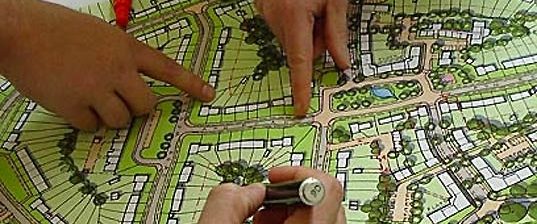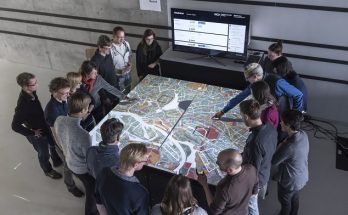Community engagement is a critical component of urban and regional planning, emphasizing the importance of involving local communities in the planning process. Effective community engagement ensures that the voices of residents are heard, fostering a sense of ownership and partnership in the development of their neighborhoods. This approach leads to more sustainable, inclusive, and equitable outcomes. This discussion highlights the importance of community engagement, methods for effective engagement, participatory planning, and the benefits of inclusive decision-making.

Importance of Community Engagement
- Empowerment and Ownership:
Engaging local communities in the planning process empowers residents by giving them a voice in decisions that affect their lives. When community members participate in planning, they develop a sense of ownership and investment in the outcomes, leading to greater support and cooperation. - Contextual Knowledge:
Local residents possess invaluable knowledge about their neighborhoods, including historical context, social dynamics, and unique challenges. Incorporating this local expertise ensures that planning decisions are grounded in the reality of the community’s needs and aspirations. - Social Equity:
Inclusive community engagement promotes social equity by ensuring that all voices, especially those of marginalized and underrepresented groups, are considered in the planning process. This approach helps address disparities and ensures that planning outcomes benefit everyone, not just a select few. - Sustainable Solutions:
Community engagement leads to more sustainable planning solutions. When residents are involved in the planning process, they are more likely to support and maintain projects, ensuring long-term success and sustainability.
Methods for Effective Community Engagement
- Public Meetings and Workshops:
Hosting public meetings and workshops provides a platform for residents to share their ideas, concerns, and feedback. These gatherings should be accessible, welcoming, and structured to encourage open dialogue and participation from diverse community members. - Surveys and Questionnaires:
Distributing surveys and questionnaires allows planners to gather input from a broad segment of the community. These tools can be used to assess needs, preferences, and priorities, providing valuable data to inform planning decisions. - Focus Groups:
Conducting focus groups with specific segments of the community, such as youth, seniors, or business owners, allows for in-depth discussions on particular issues. Focus groups can provide detailed insights and highlight the perspectives of different community members. - Digital Engagement Platforms:
Utilizing digital tools such as online forums, social media, and interactive mapping platforms can enhance community engagement by reaching a wider audience. These platforms allow residents to participate in planning discussions at their convenience, making engagement more inclusive and accessible. - Participatory Planning:
Participatory planning involves residents directly in the design and decision-making process. Techniques such as charrettes, co-design workshops, and participatory budgeting enable community members to collaborate with planners in creating plans and projects that reflect their vision and needs.
Benefits of Inclusive Decision-Making
- Enhanced Trust and Transparency:
Inclusive decision-making fosters trust between the community and planners. When residents see that their input is valued and incorporated into planning decisions, they are more likely to trust the process and support the outcomes. - Better Outcomes:
Planning decisions that incorporate diverse perspectives are more likely to address a wide range of needs and challenges. Inclusive decision-making leads to more comprehensive and well-rounded solutions that benefit the entire community. - Conflict Resolution:
Engaging the community in the planning process helps identify and address potential conflicts early on. By involving residents in discussions and negotiations, planners can find common ground and develop solutions that mitigate conflicts and build consensus. - Increased Civic Engagement:
Community engagement in planning encourages residents to become more involved in civic activities. This increased engagement can lead to a more active and informed citizenry, fostering a stronger and more resilient community. - Innovation and Creativity:
Inclusive decision-making taps into the creativity and innovation of the community. Diverse perspectives can generate new ideas and approaches that planners may not have considered, leading to more innovative and effective solutions.
Case Studies
- Seattle’s Neighborhood Planning Program:
Seattle’s Neighborhood Planning Program is a successful example of community engagement in urban planning. The program involves residents in creating neighborhood plans that reflect their priorities and vision. Through a series of public meetings, workshops, and surveys, the city gathers input from diverse community members, ensuring that plans are inclusive and representative. - Portland’s Community Engagement Initiative:
Portland’s Community Engagement Initiative focuses on involving underrepresented groups in the planning process. The city uses a variety of engagement methods, including focus groups, digital platforms, and participatory budgeting, to ensure that all voices are heard. This approach has led to more equitable and inclusive planning outcomes. - London’s Elephant and Castle Regeneration:
The Elephant and Castle regeneration project in London is an example of successful participatory planning. The project involved extensive community engagement, including workshops, charrettes, and public consultations. Residents played a key role in shaping the redevelopment plans, ensuring that the project met their needs and preserved the area’s cultural heritage.
Conclusion
Community engagement in planning is essential for creating sustainable, inclusive, and equitable urban environments. By involving local communities in the planning process, planners can harness the knowledge, creativity, and perspectives of residents, leading to better outcomes and increased support for projects. Effective community engagement methods, such as public meetings, surveys, focus groups, digital platforms, and participatory planning, ensure that all voices are heard and valued. The benefits of inclusive decision-making include enhanced trust, better outcomes, conflict resolution, increased civic engagement, and innovation. Successful case studies from cities like Seattle, Portland, and London demonstrate the transformative potential of community engagement in urban planning.



